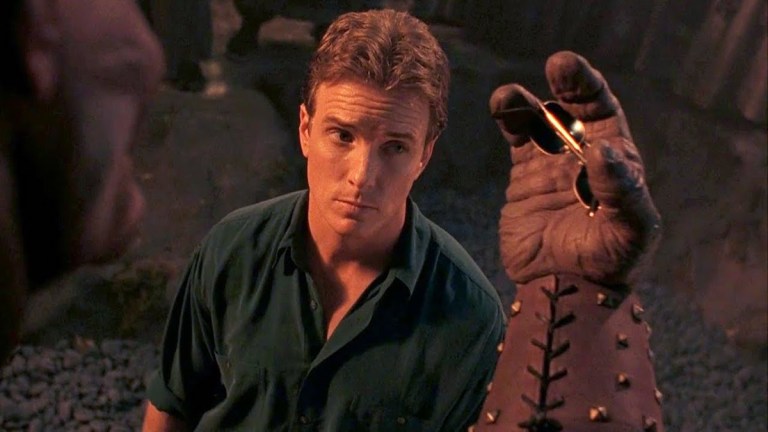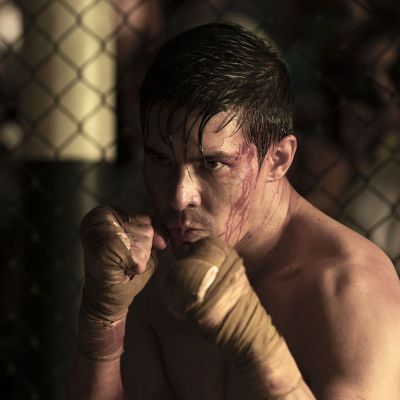Mortal Kombat: An Ode to Johnny Cage and His $500 Sunglasses
The Mortal Kombat remake will have better special effects, but the 1995 film will always have Johnny Cage and his really cool shades.

It might be the highest moment of tension in 1995’s Mortal Kombat. While the video game movie positions a wonderful, scenery-chewing Cary-Hiroyuki Tagawa as its big bad, I doubt many feared how Robin Shou would handle him in the ring. But Johnny Cage fighting Goro? It’s B-movie actor Linden Ashby playing B-movie actor Johnny Cage, and both the performer and character are entering the arena with a six-limbed demon—a bellowing banshee who just murdered a dozen other token “good guys.” The beast even has the cojones to steal Johnny’s signature sunglasses before the bout and crush them in his hand. How scary is that?
Not very, as it turns out.
As soon as the bell rings, Johnny pulls an honest-to-Raiden split, just like he’s Jean-Claude Van Damme, and punches the stony monster directly in the loincloth. At least in ’95, director Paul W.S. Anderson understood the assignment when it came to adapting video games to live-action, and Ashby’s Johnny Cage rocked that interpretation with real movie star charm.
Twenty-six years later, we’re about to see a new Mortal Kombat reboot on HBO Max and in theaters, which is exciting. As much guilty fun as the original movie is, it’s not exactly one of the 1990s’ sacred cows. And the mythology that video game developers have built around what was once just an arcade beat ‘em up is dizzyingly complicated these days. So there’s plenty of new material to mine—as well as the chance to refreshingly put Asian voices and actors front and center. It’s likely for these reasons the character Johnny Cage is apparently not featured in Mortal Kombat (2021). Plus, where would there be room for him? Judging by the trailer alone, the modern filmmakers are going for a more somber, gritty aesthetic.
All of which is fine. Still, without seeing the movie, I can’t help but wonder if they might be losing something without Johnny Cage and those ridiculous shades. Goro certainly felt lost when, in the first movie’s best scene, he followed Johnny from the ring to a cliffside. It was there Cage shouted, “Those were $500 sunglasses, asshole” before kicking the monster ass-first into the sea.
I can personally attest that back in the mid-‘90s, there wasn’t an eight-year-old who didn’t think that this was cinema at its finest.
In the original Mortal Kombat movie, Cage technically isn’t the main hero, nor should he be. Cage is essentially the plucky comic relief, with the film belonging to Liu Kang (Shou), the descendant of a long line of warriors who each generation must fight in the Mortal Kombat tournament to save Earth from being absorbed by the evil dimension of Outworld. If the plot of the games and movies are a goofy rip-off of Enter the Dragon, then Liu Kang is our Bruce Lee. He must be the stoic hero who saves us all.
And yet, given the fighting game source material, filmmakers Anderson and his screenwriter Kevin Droney needed to build a whole ensemble of likable heroes and evil sorcerers. The film handles these requirements serviceably well on the whole, minus the complete sidelining of Bridgette Wilson’s Sonya Blade to damsel in distress status during the third act. Otherwise, Mortal Kombat ‘95 strikes gold by taking the Johnny Cage character from the game—a martial arts movie star who hilariously enters a life and death tournament to prove he doesn’t use stuntmen or trick photography—and turning him into a scene-stealing quip-delivery system.
Ironically, it’s a role that would’ve been perfect for Jean-Claude Van Damme, a star of Hollywood cheesefests who really could do those oh, so impressive splits but got lumped into the company of Steven Seagal and Chuck Norris. And unfortunately for him, Van Damme had already starred in a video game movie, with Capcom convincing Universal Pictures to cast the Belgian with a thick accent as their all-American Army hero, Col. Guile, in Street Fighter (1994). Maybe something got lost in translation during those boardroom meetings?
In any event, it worked out in Mortal Kombat’s favor where instead of casting a star of bad ‘90s martial arts movies, they hired someone who inadvertently could satirize them. Technically, as a Kung Fu flick, Mortal Kombat is damnably guilty of the criticism Johnny Cage is trying to avoid: It relies quite a bit on stunt doubles and tight editing for many of its fight scenes. While Robin Shou indeed kicks ass in his own stunts as Liu Kang, let’s just say that quick insert shots don’t make it any more believable that Ashby did his own split in front of Goro. Nor does The Immortals’ awesome “Mortal Kombat” techno mix hide how choreographed Wilson’s clothesline punch might be.
Yet it should be noted both were game, with Wilson doing all of her own stunts, and Ashby doing so much of his own in the Scorpion bout that an unexpected axe kick to the kidneys left him peeing blood for a week.
Luckily, his Johnny Cage is so damn delightful through all of it that none of those backstage traumas mattered on screen—especially for the film’s target audience of teenagers and elementary schoolers. Full of mid-‘90s arrogance and cockiness, Johnny could easily come off as a dated cad, and maybe does when he cracks to Sonya that “it’s a man thing” about why he and Liu feel the need to insert themselves like the Scooby Gang into her investigation of Shang Tsung’s island.
But his energy is ultimately irresistible in a movie this wacky. Indeed, it’s a tricky proposition to put on a straight face while selling lore about lightning gods and ninjas descended from dinosaurs (Google “Mortal Kombat” and “Reptile”). The 2021 approach is admirably ambitious, but at least for 25 years ago, leaning into Johnny’s sideways smirk was more than the right impulse; it let the movie get away with almost anything. It also gave permission to the audience to bask in the film’s otherwise wonderfully over-the-top set design.
Interestingly, much of this winsome humor was either improvised or written on the spot by Ashby and Christopher Lambert, the latter of whom played Lord Raiden. According to Ashby in a 20th anniversary interview with THR, it was even during these late-in-the-game brainstorming sessions he came up with the line, “Those were $500 sunglasses.”
“We worked hard on it” Ashby said, “We didn’t write Hamlet or anything, but we had a lot of fun with it.”
And through that fun, Johnny becomes both superhero and Greek choir. He’s the guy who even after hearing the fate of the entire planet rests on his martial arts skills can still be more concerned about getting his luggage into the ancient rowboat than working on his Karate chops; he also lets the nonsense of this movie roll off the viewers like so many popcorn kernels. As the character insists, “We’re standing, they’re not. What more do you want?”
Other than that awesome techno beat, not a whole lot. Johnny is the safety valve for Mortal Kombat’s lethal levels of absurdity, which inexplicably makes him as compelling a hero as any of them. When he walks into the ring with a giant hexapod ready to stomp on his eyewear, he’s been told he’s the most egotistical, self-deluded person we’ve ever met.
“Yeah, well you forgot good-looking,” he shoots back. After seeing him kick Goro off a mountaintop, you believe him.

